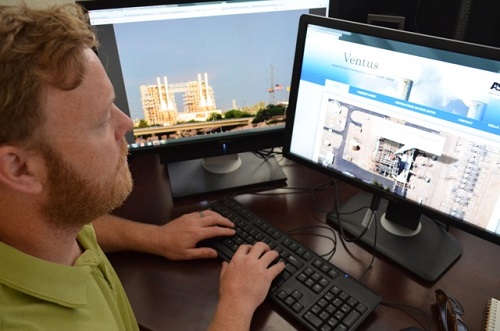Scientists use crowd-sourcing to help map global CO2 emissions
Posted on 8 June 2013 by John Hartz
This article is a reprint of a news release posted by Arizona State University on May 13, 2013.
Researchers launch environmental "game" for citizen scientists

Darragh O'Keefe (GIS specialist) logs on to the Ventus website to demonstrate its Google maps interface. Photo credit: Sandra Leander
Climate science researchers from Arizona State University are launching a first-of-its kind online “game” to better understand the sources of global warming gases. By engaging “citizen scientists,” the researchers hope to locate all the power plants around the world and quantify their carbon dioxide emissions (CO2).
The game officially launches today and is housed on a website called “Ventus.” Ventus (the Latin word for wind) has a simple interface in which users enter basic information about the world’s power plants. By playing the game, people around the globe can help solve the climate change problem.
Kevin Gurney, an associate professor in ASU’s School of Life Sciences in the College of Liberal Arts and Sciences and lead scientist for the project, estimates there are as many as 30,000 power plants around the world burning fossil fuels. While a list of those facilities (created by the Center for Global Development) does exist, scientifically accurate information the researchers need to map each power plant’s location and carbon dioxide emissions—does not.
“Of all the fossil fuel CO2 emissions in the world, power plants account for almost half—so a pretty big portion of the climate change problem is due to the production of electricity everywhere in the world,” said Gurney, also a senior scientist with ASU’s Global Institute of Sustainability. “While you might imagine that we would know where they are and how much they’re emitting, it turns out we don’t. With the growth in countries such as China, India and Brazil, this lack of information is poses challenges for both basic science and climate change solutions.”
"The Ventus project will empower citizen scientists with a simple tool that can truly make a difference in solving a significant climate change problem,” said ASU President Michael M. Crow. “With more accurate scientific information on every power plant in the world, international leaders in political and scientific fields can work together more effectively to address carbon dioxide emissions and climate change.”
Players who know the amount of CO2 emissions from a specific power plant have valuable information to use in the game. Additionally, Gurney and his team need three other pieces of information: the location of the facility (within a few hundred meters), the fuel used, and the amount of electricity produced. Players may enter all or only a portion of the information. Researchers have started the process by entering approximately 25,000 power plants onto the map so people can see what already exists in the Ventus database.
“Ventus uses a Google Earth map which allows someone playing the game to drop pins on the power plants,” explained Darragh O’Keefe, the ASU research scientist who built the website. “Our logic is that for every power plant in the world, there are probably at least a dozen people who live near it, work at it, or know someone who works at it. With the proliferation of phones and GPS, it makes it pretty easy to locate things.” In addition, the Ventus website will be translated into several other languages to help facilitate worldwide participation.
Players will be free to look at all the data researchers currently have from many power plants around the world. Then, players can adjust that information or make edits to their previous entries. The game does not require registration to play, however, Gurney and his team will choose a winner who, at the end of the first year, has provided the greatest amount of useable information. To be considered for the competition, players must register.
While crowd sourcing a problem such as this one is unusual in the science community, Gurney’s team believes this innovative effort might work to solve a fairly profound problem. And, Gurney believes that most people around the world care about what happens to our environment.
“Through Ventus, people around the world can play an active role in helping to solve the climate change problem,” Gurney said. “We hope to gather a global team of people who want to make a difference — and do so, right now. The information we gather from Ventus can ultimately help determine what we as a society, can do locally and globally about climate change.”
Notes:
Gurney is a senior sustainability scientist with ASU’s Global Institute of Sustainability and School of Sustainability, and affiliated with the School of Geographical Sciences & Urban Planning.
The Ventus project is funded by a National Science Foundation CAREER award.
Connect with Ventus
Website: http://ventus.project.asu.edu/
Facebook: https://www.facebook.com/VentusProject
Twitter: @ventus_project
Pinterest: https://pinterest.com/ventusproject/































 Arguments
Arguments






























I tried to include one from Brazil, (-3,6808037378312144, -38,86519119143486) but it keeps saying "invalid coordinates" or something to that effect.